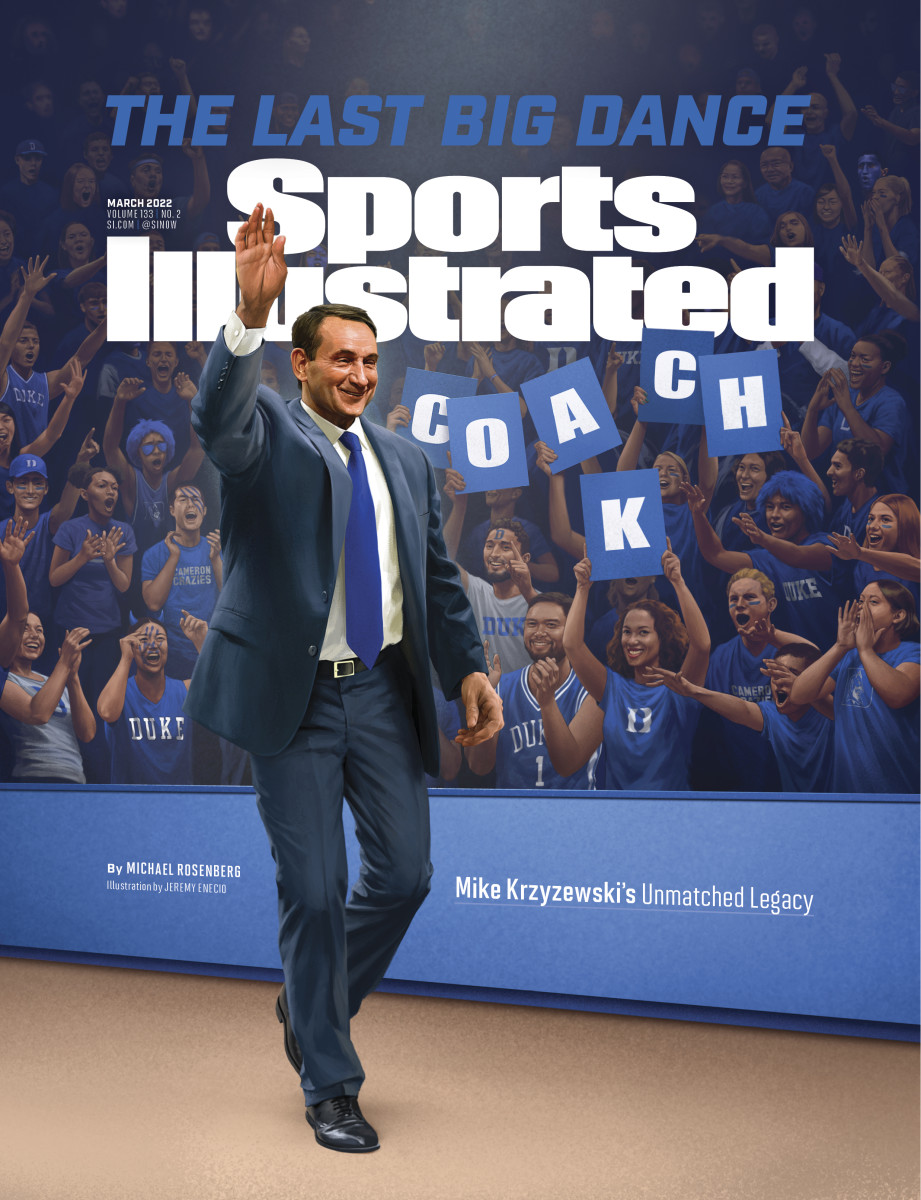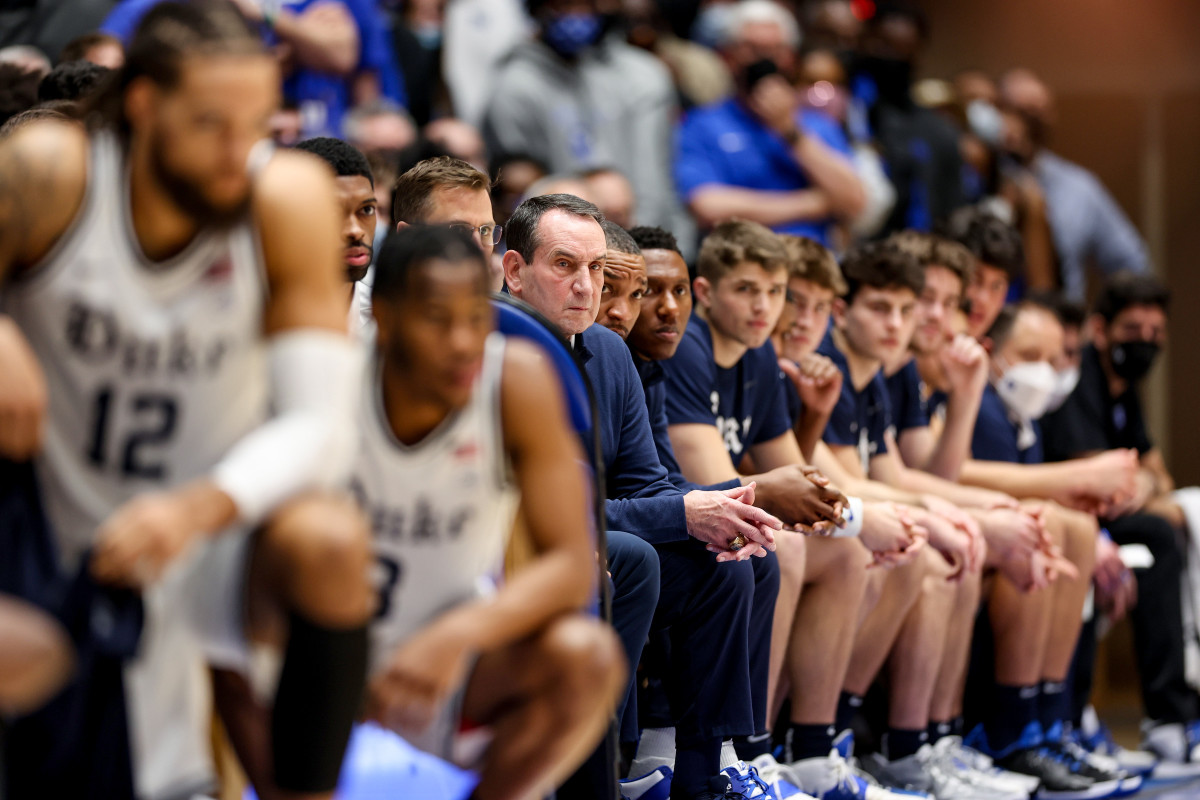Coach K, the Team Builder

Chip Engelland has pulled off a rare basketball double: He has won with Gregg Popovich and lost with Mike Krzyzewski. Engelland has been a Spurs assistant under Pop for 17 years, winning two championships and establishing himself as one of the best shooting coaches in the world. But four decades ago he was a Duke forward during Krzyzewski’s first three years at the school, when the Blue Devils finished twice with losing records and never made the NCAA tournament.
Nobody, including Engelland, knew then that Krzyzewski would become one of the best basketball coaches ever. But years of seeing Popovich’s greatness firsthand in San Antonio and Coach K’s from afar have helped him understand how he did.
“They’re thinking about the team all the time,” Engelland says. “They’re just trying to figure out how everything’s gonna work together. And that could be from the walk-on players at Duke or the Spurs’ two-way players. Those are all important decisions. It’s not just: How do we handle the star? They’re thinking about the walk-on player who may not play a minute that season.”

This sounds so basic as to be unremarkable. But Krzyzewski’s success does not come from what he does with X’s and O’s. It is his ability to shape people into a team—to understand that the last man on the bench might be at the center of the social circle, that the guy playing the best might not be playing hardest, that one player who is struggling might need encouragement while another who is struggling needs to be chewed out. Every interaction matters.
There are many ways to illustrate Krzyzewski’s achievements. Five national titles. Twelve Final Fours. Almost 1,200 wins, more than any coach in Division I history. But this might explain him best: In Krzyzewski’s 41 years at Durham (not counting this season), the Blue Devils have missed just five NCAA tournaments. One was in 1994–95, when Krzyzewski took a leave of absence because of back surgery and the team, which started 9–3, fell apart. Another was last season, when COVID-19 kept players and coaches from interacting as closely as they usually do. And the other three were his first three seasons at Duke, when he was mostly coaching players he had inherited. Even with the bulk of a team that made the Elite Eight the year before, Krzyzewski went 17–13 his first season. He followed that with two losing seasons.
But give him the face time with players he wanted, and Krzyzewski has almost always been unstoppable.
Mike Tissaw, who was one of the holdovers in the early years, says when Krzyzewski’s first big recruiting class showed up, “It just dawned on me: Hey, you know, he has just always needed the kinds of players that he wants. And we haven’t been those players, for the most part.”
Krzyzewski had a different connection with that 1982 recruiting class, which featured Johnny Dawkins, Mark Alarie and Jay Bilas. It wasn’t favoritism. The bond was genuine: “We’re probably, early on, not as comfortable with him,” Engelland says. “He’s getting to know us on the fly. When you’ve been in everybody’s living room when they’re in high school, there’s a closeness there.”
Krzyzewski’s Final Four teams in the 1980s were often depicted as scrappy overachievers, a lazy portrayal stemming from the fact that some prominent Blue Devils were white. (The ’90–91 Duke team that stunned UNLV in the NCAA Final Four had more lottery picks, three, than the Runnin’ Rebels.) His recent teams have had so many one-and-done NBA stars that critics have wondered how much coaching is really involved. But through the years, Krzyzewski’s greatest skill has been constant: He is a master at getting everybody in his program to do what he thinks they need to do.

Krzyzewski announced his pending retirement last June, shortly after rival Roy Williams of North Carolina had retired, and there was immediate speculation that name, image and likeness rules were sending the old guard out. But Krzyzewski has supported the new rules. He has pushed college basketball to modernize for years. He bristled at any implication that he couldn’t handle change, and rightfully so: No basketball coach in history weathered so much so well.
When Krzyzewski took the Duke job, in 1980, there was no shot clock. When he first led the Blue Devils to the Final Four, in ’86, there was no three-point line. He thrived when the game was dominated by seniors and then when freshmen ruled; before cellphones and in the social media age.
Krzyzewski is demanding and can go f-bomb for f-bomb with any coach in America. But what separates him from his mentor, Bob Knight, is his adaptability. Tissaw remembers thinking Coach K was “brilliant” when it came to teaching man-to-man, his long-preferred defense. But in 2015, Krzyzewski realized star freshmen Tyus Jones, Justise Winslow and Jahlil Okafor wouldn’t stick around long enough to allow Duke to develop into a great man-to-man team. He started sprinkling in some zone, and the team won the national title.
Knight proudly called himself “an anachronism. . . . I’m 20 years behind the times”—and that was before he turned 40. Krzyzewski is 75, and his feet are planted firmly in 2022. He watches Duke film until he has peace of mind and watches his Chicago Bears on Sundays. His current team could seize his sixth national title—more than Knight and Dean Smith combined to win.
Coaching, especially on the collegiate level, requires a combination of manipulation and trust. The trust must come first. When he arrived at Duke, taking over after Bill Foster left for South Carolina, Krzyzewski went after some of the nation’s top recruits and whiffed on all of them. He later blamed himself, saying, “We were recruiting too many people.” He did not make that mistake again.
Even in the one-and-done era, with so much turnover on rosters, Coach K has arguably been the most selective recruiter in the country. Players know he does not throw scholarships around like candy. He makes an offer only when he really wants somebody. That faith builds the trust that serves as the foundation of his teams.
Krzyzewski is as competitive and feisty as the worst-behaved coaches, but self-aware enough not to be one of them. More than once he has sparred with the Duke student newspaper, The Chronicle, but he has apologized. He is relentlessly gracious in defeat, visiting the locker room of No. 14 seed Mercer to congratulate the Bears on beating his team in the 2014 tournament, and he can be charmingly self-deprecating and funny, too. A reporter once asked him whether he was a big karma guy, to which Krzyzewski responded: “A karma guy? I’m a Polish guy.”
If the public persona was a recruiting tool, it was an effective one, and Krzyzewski has not let his image get in the way of his program. He timed his retirement announcement to give Duke time to form a succession plan—his former guard and current assistant, Jon Scheyer, will take over—but swore he would keep the focus on the season. For the 42nd straight year, he has done it.

Engelland knew his young coach ran exceptionally well-structured practices, and he remembers this, too: “He would stop it at the perfect time. The great coaches don’t overtalk.” Players did not have to step on the court before practice, but if they did, they had to work. The coach’s favorite play, even then, was the charge, because it brought three levels of success: drawing a foul, forcing a turnover and making the opponent wary of driving to the basket again. Engelland does not remember a lot of “Knute Rockne speeches.” Once, before the Blue Devils played powerful Louisville in 1982, Krzyzewski turned out the locker room lights, entered with a candle and told his team they were not there to praise the Cardinals, they were there to beat them. They lost by 38.
As the defeats accumulated, Tissaw recalls, “A fairly influential faculty member, whom I liked a lot, actually said, ‘I can guarantee that Coach K will not be here within the next year or two.’” Krzyzewski, who knew how precarious his standing was, has credited then AD Tom Butters for sticking with him. In January of Krzyzewski’s fourth season—with Duke unranked, in the middle of a four-game losing streak and coming off a fifth straight loss to North Carolina—Butters gave him a five-year extension.
Dawkins’s recruiting class saved Krzyzewski. It also gave him credibility with everyone who came after. In retrospect, what is remarkable about K’s early years is that he was always himself, even when the whole campus seemed to want somebody else. The players on K’s first teams did not reach the same heights as Christian Laettner or Shane Battier, but they got the same coaching.
“Pat Conroy, the writer, said, ‘Losing teams don’t have reunions,’” Engelland says. “And there’s something wrong with that, but it is true.”
In lieu of reunions, in many years players could go watch their coach and their alma mater in the Final Four and enjoy the reflected glory their successors provided. Duke talks about its “brotherhood,” and cynics wince, but Engelland and his teammates are proof of it. Krzyzewski did not recruit them. They did not win much for him. And yet . . .
“They could be No. 1 in the country,” Engelland says, “and if you wrote him a thank-you note, whether it was for tickets or just you know, Hey, Coach, just want to let you know, I’m playing here, and thanks, he would write you back. It was incredible.”
The banners will remain long after Krzyzewski stops coaching. The letters will, too.
• The Inside Stories of the Rams’ Super Bowl Run
• The Truth Behind Joe Burrow's Cigar Celebrations
• SoFi Stadium Went Up—and Then Everything Changed
